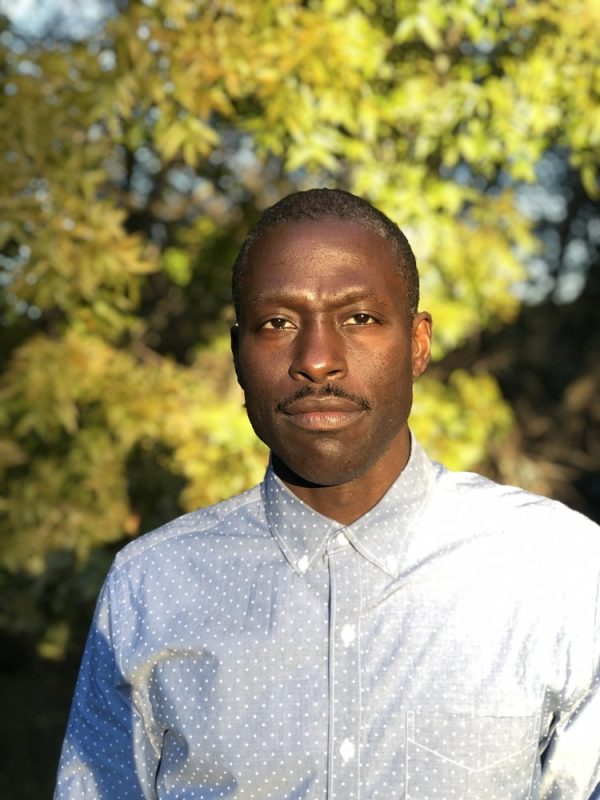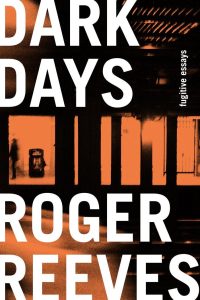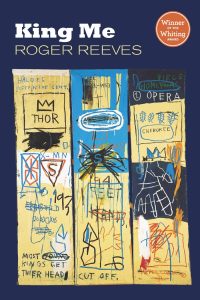

Roger Reeves
Acclaimed Poet, Essayist & Critic
Kingsley Tufts Award Winner
Griffin Poetry Prize Winner


Biography
“A sophisticated and breathtaking writer, Roger Reeves takes the reader on a harrowing journey: each poem comes packed with arresting imagery, relentless in its examination of how tragedy and trauma become internalized—cleaning out the wounds to understand the pain.” —Los Angeles Review of Books
“I cannot overstate the brilliance of Roger Reeves. A sentence inside a Reeves poem is a score of breath; a scripture with texture and subtext; a tightrope of expansive, existential syntax. Peerless and unprecedented.” ―Terrance Hayes
“Roger Reeves contemplates the silence, the introspection necessary for eloquent responses to our increasingly frightening world.” ―Best American Poetry
“Amid the brutalities of abuse, death, and decay, Roger Reeves’ poems both apprehend and enact a sometimes terrifying beauty.” ―Poetry Foundation
Roger Reeves is the author of Dark Days (Graywolf Press, 2024) and Best Barbarian (W.W. Norton & Co., 2022), winner of the 2023 Griffin Poetry Prize and the Kingsley Tufts Poetry Award, and a finalist for the National Book Award. Terrance Hayes called the collection ”Peerless and unprecedented…a monumental and elegiac tour de force.” Reeves’ debut poetry collection King Me (Copper Canyon Press, 2013), was a Library Journal Best Poetry Book of the year, winner of the Larry Levis Reading Prize, the PEN/Oakland Josephine Miles Literary Award, and a John C. Zacharis First Book Award.
His most recent work, the nonfiction collection Dark Days: Fugitive Essays, won of the GLCA New Writers Award for Creative Nonfiction and was a finalist for the 2024 Pegasus Award in Poetry Criticism. Eula Biss observed of these critical essays: “In this heady collection, Roger Reeves troubles history, steps out on faith, dances with the dead, locates his grandmother in a footnote, and finds a way to answer his daughter when she asks if the sirens are coming to kill her. All along, Reeves is close-reading poetry, music, fiction, and film and showing us what it means to be underground, to be ‘in and out of time.”
His poems have appeared in journals such as Poetry, Ploughshares, American Poetry Review, Boston Review, and Tin House, among others. He is the recipient of a Guggenheim Fellowship, a Radcliffe Fellowship from Harvard University, a Whiting Award, an NEA Fellowship, a Ruth Lilly Fellowship from the Poetry Foundation, a Hodder Fellowship from Princeton University, two Bread Loaf Scholarships, an Alberta H. Walker Scholarship from the Provincetown Fine Arts Work Center, and two Cave Canem Fellowships.
When asked on the podcast First Draft about the sensory experience in his work, Reeves said, “I want to make the sentence be a feeling because one of the things we carry with us well is feeling. And what I mean by well is we know our feelings, we can be with our feelings, we’re all kind of experts of our own feelings, hopefully. And so, I want it to feel corporeal. I want the essays to feel as if they are embodying pleasure, that they are playing. I want to make a sentence that makes people feel. I want people to feel as if, even if they didn’t understand the sentence, they understand it, maybe physically corporeally, right, that the sentence is physically enacting something on them.”
He earned an MFA from the James A. Michener Center for Creative Writing at the University of Texas at Austin, and a PhD from the University of Texas at Austin. He is currently a Professor of English and creative writing at the University of Texas at Austin.
Short Bio
Roger Reeves is the author three collections, including: Dark Days: Fugitive Essays, won of the GLCA New Writers Award for Creative Nonfiction and was a finalist for the 2024 Pegasus Award in Poetry Criticism; Best Barbarian, winner of the 2023 Griffin Poetry Prize and the Kingsley Tufts Poetry Award, and a finalist for the National Book Award. Reeves’ debut collection King Me was a Library Journal Best Poetry Book of the year, winner of the Larry Levis Reading Prize, the PEN/Oakland Josephine Miles Literary Award, and a John C. Zacharis First Book Award. His poems have appeared in journals such as Poetry, Ploughshares, American Poetry Review, Boston Review, and Tin House, among others. He is the recipient of a Guggenheim Fellowship, a Radcliffe Fellowship from Harvard University, a Whiting Award, an NEA Fellowship, a Ruth Lilly Fellowship from the Poetry Foundation, a Hodder Fellowship from Princeton University, two Bread Loaf Scholarships, an Alberta H. Walker Scholarship from the Provincetown Fine Arts Work Center, and two Cave Canem Fellowships. He is currently a Professor of English and creative writing at the University of Texas at Austin.
Videos
Publications
Dark Days: Fugitive Essays
Nonfiction, 2023
“Stunning. . . . In a variety of pieces exploring race and legacy and community, Reeves captures the sorrows inherent in the way we live today even while keeping a keen eye toward opportunity for joy.”—Maris Kreizman, Vulture
In his debut work of nonfiction, award-winning poet Roger Reeves finds new meaning in silence, protest, fugitivity, freedom, and ecstasy. Braiding memoir, theory, and criticism, Reeves juxtaposes the images of an opera singer breaking the state-mandated silence curfew by singing out into the streets of Santiago, Chile, and a father teaching his daughter to laugh out loud at the planes dropping bombs on them in Aleppo, Syria. He describes the history of the hush harbor―places where enslaved people could steal away to find silence and court ecstasy, to the side of their impossible conditions. In other essays, Reeves highlights a chapter in Toni Morrison’s Beloved to locate common purpose between Black and Indigenous peoples; he visits the realities of enslaved people on McLeod Plantation, where some of the descendants of those formerly enslaved lived into the 1990s; and he explores his own family history, his learning to read closely through the Pentecostal church tradition, and his passing on of reading as a pleasure, freedom, and solace to his daughter, who is frightened the police will gun them down.
Together, these groundbreaking essays build a profound vision for how to see and experience the world in our present moment, and how to strive toward an alternative existence in intentional community underground. “The peace we fight and search for,” Reeves writes, “begins and ends with being still.”
Best Barbarian
Poetry, 2022
The poems in Best Barbarian roam across the literary and social landscape, from Beowulf’s Grendel to the jazz musician Alice Coltrane, from reckoning with immigration at the U.S.–Mexico border to thinking through the fraught beauty of the moon on a summer night after the police have killed a Black man.
Daring and formally elegant, Best Barbarian asks the reader: “Who has not been an entryway shuddering in the wind / Of another’s want, a rose nailed to some dark longing and bled?” Reeves extends his inquiry into the work of writers who have come before, conversing with―and sometimes contradicting―Walt Whitman, James Baldwin, Sappho, Dante, and Aimé Césaire, among others. Expanding the tradition of poetry to reach from Gilgamesh and the Aeneid to Drake and Beyoncé, Reeves adds his voice to a long song that seeks to address itself “only to freedom.”
Best Barbarian asks the reader to stay close as it plunges into catastrophe and finds surprising moments of joy and intimacy. This fearless, musical, and oracular collection announces Roger Reeves as an essential voice in American poetry.
King Me
Poetry, 2013
“King Me is an expression from the game of checkers, declared when one player’s piece reaches the opponent’s end of the board and is “kinged,” allowing it a much greater range of movement. Reeves’s debut begins with that demand, a bold but risky gambit. Reeves is interested in the intersection of politics and the personal.” —Library Journal
King Me, the debut collection by Roger Reeves, gathers the fragments of American identity and makes each poem sing of its beauty and its horror. Adopting personae that range from a horse witnessing the lynching of Emmett Till to Mikhail Bulgakov chronicling the forced famines in Poland in the 1930s, Reeves investigates violence and the politics of poverty, gender, race, and self.
Reflecting traditions and aesthetics from Audre Lorde to the Black Arts movement, from Whitman to Lil Wayne, King Me is poignantly lyrical, filled with lush scenes of both beauty and decay. Even as the poet exposes the most appalling acts of humanity, here there is great tenderness and generosity.
Articles & Audio
Read What’s In Print
• When the Prince of Heaven Sleeps – Emergence Magazine
• Review: Is There A Right Way to Talk About Black Culture? – New York Times
• Roger Reeves on Sensory Essays: In Conversation with Mitzi Rapkin – Literary Hub
• A Conversation with Roger Reeves – AGNI
• Two Roads: A Review-in-Dialogue of Roger Reeves’s Best Barbarian – LA Review of Books
• 3Q4: Roger Reeves – The Sewanee Review
• “All Your Base Are Belong to Us”: on Roger Reeves’ Best Barbarian – Heavy Feather Review
Listen to Audio
• When the Prince of Heaven Sleeps – Emergence Magazine Podcast
Selected Writings
• Read “Domestic Violence” – The Poetry Foundation
• Read “Prayer to the Gods of the Night, II” – Academy of American Poets
Cymothoa Exigua
cymothoa exigua*: the tongue as what it is not—blemish
and parasite: gimp and glottal stop: what question can be
answered with a truant mouth: can the lynched man hung
from the sails of a windmill taste the lead pipe wedged
between his lips: when the signifiers dangle, empty chum
lines in a cold creek: when the men in Waco, wearing white
straw hats, fraying at the crisp edges of their white shirts,
leave Jesse, leave John, leave Paul in ashes in the unpaved
streets to choke passing mules into prophecy: when we pinch
our noses to staunch the smell of the twice burnt black man
burning for a third time this day: when the boys, sweet
and good animals, come to what’s been left in shallow ditches:
false rib and femur, clavicle and severed hand—quite simply,
the language of sorrow: glyph of the gadfly rooting himself
into the rotting meat of the dead: when it is too late
to refuse our bodies being made urns: corn, unharvested
and heavy in its husks: when, in the marketplace, the butcher lifts
our tongue from a bed of ice, shouts: who will speak for this flesh:
when the tongue answers as all severed tongues do:


